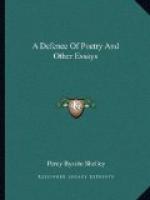Homer and the cyclic poets were followed at a certain interval by the dramatic and lyrical poets of Athens, who flourished contemporaneously with all that is most perfect in the kindred expressions of the poetical faculty; architecture, painting, music the dance, sculpture, philosophy, and, we may add, the forms of civil life. For although the scheme of Athenian society was deformed by many imperfections which the poetry existing in chivalry and Christianity has erased from the habits and institutions of modern Europe; yet never at any other period has so much energy, beauty, and virtue, been developed; never was blind strength and stubborn form so disciplined and rendered subject to the will of man, or that will less repugnant to the dictates of the beautiful and the true, as during the century which preceded the death of Socrates. Of no other epoch in the history of our species have we records and fragments stamped so visibly with the image of the divinity in man. But it is poetry alone, in form, in action, or in language, which has rendered this epoch memorable above all others, and the storehouse of examples to everlasting time. For written poetry existed at that epoch simultaneously with the other arts, and it is an idle inquiry to demand which gave and which received the light, which all, as from a common focus, have scattered over the darkest periods of succeeding time. We know no more of cause and effect than a constant conjunction of events: poetry is ever found to coexist with whatever other arts contribute to the happiness and perfection of man. I appeal to what has already been established to distinguish between the cause and the effect.




